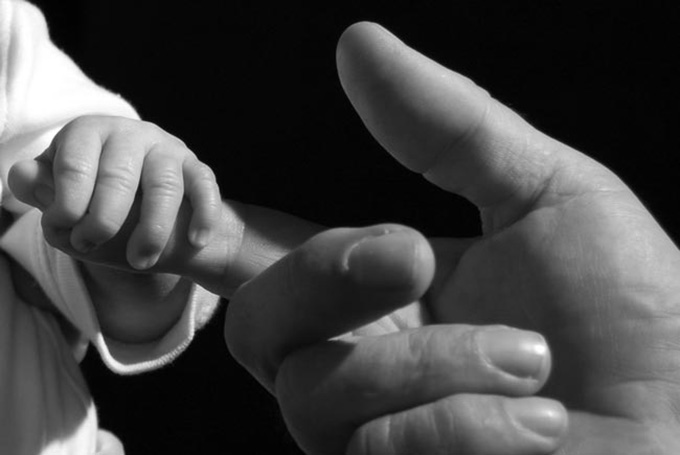Near the end of my PhD, my partner, an early career researcher, was being honoured by her professional society with a career award. We travelled interstate to a conference and to attend the fancy conference dinner together, where she was to deliver a short speech on stage in front of a couple hundred of her colleagues.
About half an hour before the dinner, we received a call from our fertility specialist diagnosing my partner with an ectopic pregnancy, which is a very difficult and potentially life-threatening form of miscarriage. We are in a same sex relationship, and the journey to get to the point of pregnancy had already been legally, practically, and emotionally complicated.
At the conference dinner, my partner schmoozed with the best of them. Her hand was shaken, her photograph was taken, and she was engaged in vigorous conversation the entire evening. She got up on stage, accepted her award and delivered a spectacular and uplifting speech, which received warm and enthusiastic applause. She was the picture of grace under pressure.
There are a lot of fantastic blog posts around that discuss the trials and tribulations of starting and balancing an academic career with family responsibilities. There are some really fantastic online communities for PhD mums (which, incidentally, is the kind of mum I came from) and although there is a long (LONG) way to go, it generally seems like we as academics are getting better at talking about and recognising the challenge of being academics and being parents.
Despite this progress, the process of starting a family itself – the pains and anxieties that can come along with trying for, or losing a pregnancy are still shrouded in stigma and silence. But this is a huge issue that affects many of us.
In Australia, around 1 in 6 couples seek medical assistance for fertility issues. This can range from a little bit of advice on practicalities, to managing high-risk pregnancies, to IVF treatments. It’s particularly pertinent for a lot of PhD students and early career researchers because, as I’m sure lots of us have been reminded, this is prime baby-making time.
The thing is, fertility assistance is inherently inconvenient for PhD students and researchers. There are timings and cycles that have no respect for tight deadlines, teaching responsibilities, or the need to travel for interstate or international conferences. There are often cocktails of hormones that make it virtually impossible to continue operating at your normal social and intellectual level. There are blood tests every two days before work, there are bad news phone calls (made more difficult in open plan offices), there are sometimes surgeries, there is often physical pain, and there is always, ALWAYS emotional tribulation.
I have been thinking a lot lately about how Universities can be – or become – workplaces where hopeful parents (or, indeed, anyone else struggling or grieving) can say to their colleagues or supervisor “I’m having a tough time personally and I’m not going to be as productive or as sociable as I usually am” and the response is “I’m really sorry to hear that. You don’t have to tell me anything more, but I will listen to you and try to support you if you would like me to”.
As a PhD student, I’ve been lucky enough to have a supervisor who responds like that. In my work on the side, our very own Thesis Whisperer was my supervisor, and she most definitely responds like that.
Sadly, I’ve heard and read story after story of colleagues and supervisors (both men and women) not being so understanding, whose responses have ranged from dismissive mumblings of “you’ll be alright” through to bullying (usually) women into explaining precisely what it is about their reproductive system that is causing them excruciating emotional and sometimes physical pain being “inconvenient”.
Trying to start a family is just one example of silent suffering. We can equally think of death, health issues, relationship break downs, or stressful family situations as parts of our lives that will inevitably, in some way, impact upon our work.
These parts of our lives are often private, and it should always be up to an individual (or couple) involved as to whether they disclose these kinds of experiences to colleagues or supervisors. I’m not advocating that we all start wearing our hearts on our sleeves, but I do think we need more conversation about how these inevitable facts of life can best be handled in a University environment.
This particular issue of baby-making heartache is wrapped up in complex gender norms, equity issues, and University policies. More generally, this is about how we as individuals respond to each other in moments of vulnerability.
This is about more than just being “nice” if someone discloses difficult parts of their private life to you. This is about developing skills that enable you to be a supportive and understanding colleague. This is about beginning to recognise compassion and empathy as essential skills that should be learned, developed, and prioritised as much as research, writing, and time management.
It won’t stop the silent sufferings many of us endure, but it may make it a little more bearable to know you have the support of your colleagues if you need it.
Author Bio: Dr Cathy Ayres completed her PhD in the School of Sociology at the ANU in 2016. She’s worked as a research training nerd at the ANU Research Skills and Training unit, and she is now happily working as the Senior HDR Coordinator in the College of Engineering and Computer Science.

